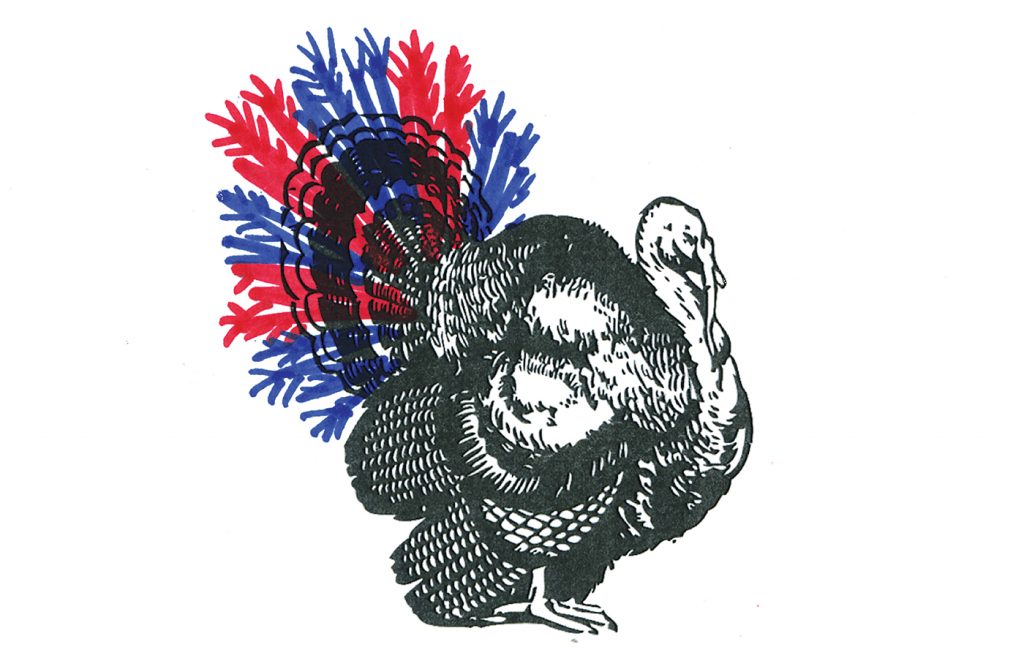
Thanksgiving may bring an unwanted guest to the table this year: tribal politics. The rest of the year we can avoid people with opposing views (you know, the ones you unfollow on social media), but on Thanksgiving we often have to welcome family members or friends whose politics are at odds with our own. Political tensions are so high right now that even if we all tacitly agree to steer clear of dangerous topics, a single snide remark or joke can slip out and then . . . well, let’s just say that many will feel gratitude—when Thanksgiving is over.
We might wish we could uninvite certain people, the way we unfollow them on Facebook. In our opinion, though, the problem isn’t who comes to Thanksgiving or what their politics are. What matters is who we are and what part of ourselves we bring to the table.
First off, let’s acknowledge that we all have a closed-minded side that “knows” we are right and is quick to defend our views. Let’s call this part Dogg Mattic. Given our intensifying tribal politics (see the October issue), our Doggs are wide awake and growling.
But we also have an open-hearted side that is receptive to learning from people with different views and curious to understand where they are coming from. Let’s call this part Bette R Angel.
Dogg and Angel have distinctive communication styles, as the examples that follow illustrate. Naturally, we want to interact from our inner Angel, yet our tribal instincts make Dogg Mattic our default mode. Why not make a conscious decision to bring your inner Angel to the Thanksgiving table? Try these suggestions from our Better Angels workshops.
Disdainful vs. Respectful Mindset
Dogg Mattic: I already know the other side’s position and don’t want to hear it. I think it’s wrong for our country, and if they can’t see that, they are either ill-informed or duped.
Bette R Angel: I genuinely want to understand the other side and why they hold particular views. I may not agree, but I recognize that they have valid points.
Suggestion: Approach people with an attitude of respect and assume that they have important perspectives.
“Gotcha” vs. Curious Questioning
Dogg Mattic: I ask “gotcha” questions to show how wrong they are, such as “How can you justify a program that denies health care to the disadvantaged?” or “How can you turn over health care to the government, which always creates a bureaucratic nightmare?”
Bette R Angel: I ask impartial questions, such as “What are your views on national, single-payer health care?”
Suggestion: Find something you are curious about and frame your questions in neutral terms.
Rebuttal vs. Receptive Listening
Dogg Mattic: While others are speaking, I am taking mental notes to refute their points. I have to restrain myself from interrupting and showing how wrong they are. The moment they stop talking, I start telling them what I think.
Bette R Angel: I actively seek to grasp others’ viewpoints. While they are speaking, I am tracking their main ideas and any points I find confusing. Before presenting my own views, I summarize my understanding and invite comments or clarifications.
Suggestion: Listen to understand, ask clarifying questions, summarize your understanding, and repeat this cycle until they confirm you’ve understood them.
Attacking vs. Affirming Response
Dogg Mattic: I point out the faults of the opposing party and describe their leaders and policies in a negative light. I email and share posts on social media that belittle their party.
Bette R Angel: I talk about how, in my opinion, the policies and programs I support can help our country. I look for areas where I can agree with another.
Suggestion: Present what is good about your side. Look for common ground with others.
What Will You Do?
Angel and Dogg represent two sides in all of us. Which one do you want to bring to your Thanksgiving table? You can bring your inner Dogg, but in our opinion, doing so would exacerbate the political animosities dividing our country. Or you can keep your Dogg in check and invite your inner Angel instead. It may take a leap of faith, but every time we act from our Angel side, we reduce defensiveness and encourage openness in others.
Why not give it a try this Thanksgiving? You may be surprised to discover a sincere person who would welcome a genuine conversation with you. And then you might even refollow your political “opponents” with a fresh curiosity to understand them. If you find that friendship and harmony can be sustained despite differing political views, you will have much to be thankful for.
To join a conversation about this article, go to JoeAndJulie.com. Email Joe and Julie at BetterAngelsIowa@gmail.com. For more information, see Better-Angels.org.
